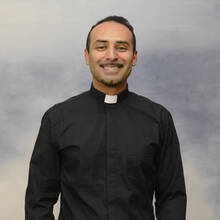Leaving happiness behind to find happiness
Life can be hard for anyone. That much is given. But then a question is raised from this Sunday’s first reading: Is striving too hard to achieve something in life also meaningless? Wisdom literature from the Old Testament revolves around questions of toil, work, happiness, loss, morality and the role of faith. This set of works includes the books of Job, Psalms, Proverbs, Ecclesiastes, Song of Songs, Wisdom and Sirach. Among these, the writer of Ecclesiastes has been called the most skeptical and pessimistic author. The content is relentless in its rawness about the inability to escape human drudgery no matter one’s state in life. This Sunday’s readings provide an opportunity to test that philosophy alongside Jesus’ parable of a rich man with a bountiful harvest, found in the Gospel of Luke.
“But God said to him, ‘You fool, this night your life will be demanded of you’” (Lk 12:20).
Are you happy?
Can you allow prayer to shape or redirect this common question?
What might be an alternative question to pray with this week?
Wisdom writings are in the business of asking questions and discerning the best course of human action. Qoheleth, the author of this Sunday’s first reading, introduces a theme for his composition thus: “For what profit comes to man from all the toil and anxiety of heart with which he has labored under the sun?” (Eccl 2:22). Qoheleth calls himself a king in Jerusalem in honor of Solomon. As such, he writes from the perspective of the royal court, a rich man with everything anyone could want out of life. His conclusion is that all things are vanity in the end and the best one can do is enjoy life when there is something worth rejoicing over. The philosophy is for an educated person of a certain class in society and not meant for people of lesser means who carry the weight of servitude.
While Qoheleth’s healthy skepticism seems out of place in Scripture, it has also been praised as being realistic about the human condition. There is wisdom, after all, in recognizing moments of joy like feasting at a party as a privileged experience that may offset the toil of human labor in efforts like study or industry.
Someone in the crowd, in this Sunday’s Gospel story, raised questions about collecting on the share of the family inheritance. This anonymous voice from the crowd represents anyone who has felt left out of the material wealth their family or neighbors have amassed over the years. Sound familiar? Jesus responded with the parable of a rich fool who accumulated enough resources for himself and perhaps for his next several generations of kin. The man’s conclusion is strikingly similar to the wisdom found in this Sunday’s first reading: Rest, eat, drink, be merry. To which the parable responds, “But God said to him, ‘You fool, this night your life will be demanded of you’” (Lk 12:20). Notice how the parable insists that you take account of what you do with your life and not the amount of possessions accumulated.
The parable does not silence the sentiment or the concerns about purpose and meaning that Ecclesiastes raised. Jesus’ parable, however, suggests that what you do in life does matter. But become rich in what matters to God and cease the endless pursuit of treasure for oneself (Lk 12:21). The Gospels do not ask questions about happiness and purpose the way some of Wisdom literature does; they present the concerns of God for the world. Do our own concerns align with that? Might there be happiness and purpose in pursuing that question?








